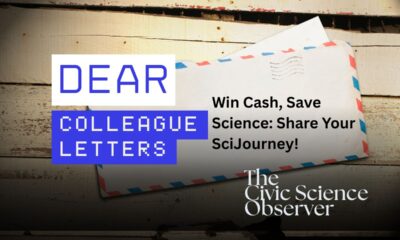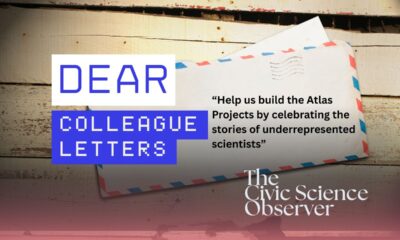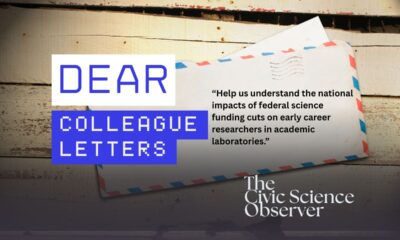Civic Science Observer
Dear Colleagues: A culture shift is still necessary for public engagement

Dear Colleagues,
Growing concerns about science literacy in the United States have led to an increased need for science outreach and communication efforts by the scientific community [1]. However, major challenges exist due to the absence of integrated formal training for scientists to conduct science outreach and to communicate effectively with a non-scientist audience. Furthermore, the existing academic structure fails to encourage and reward public engagement. Attention has already been called to the need to reconfigure graduate level education in the sciences in order to better prepare young scientists for careers outside of Academia [2]. Therefore, we propose that graduate training programs formally support and provide structured training opportunities for students to engage with their local communities and beyond.
While research in this area is limited, some studies [3,4] indicate that “scientist-in-the-classroom” or “meet-a-scientist” programs can generate significant interest in science and the scientific process. Examples of such opportunities include the Soapbox Science initiative in the United Kingdom as well as online platforms such as the podcast People Behind the Science or the show Story Collider in the United States.
These low effort opportunities allow scientists to directly engage with the community and foster a mechanism for honing science communication skills. We believe that developing and integrating these types of opportunities into PhD training programs will provide trainees with the space to train in sharing their work with the public. The formal inclusion of science outreach into all training programs will be a direct challenge to the existing academic framework that is failing to encourage and reward public engagement.
References
[1] A. I. Leshner, Public Engagement with Science. Science 299, 977 (2003).
[2] A. I. Leshner, Rethinking graduate education. Science 349, 349 (2015).
[3] S. Laursen, C. Liston, H. Thiry, J. Graf, What Good Is a Scientist in the Classroom? Participant Outcomes and Program Design Features for a Short-Duration Science Outreach Intervention in K–12 Classrooms. CBE— Life Sciences Education 6, 49-64 (2007).
[4] E. R. Burns, Anatomy of a successful K–12 educational outreach program in the health sciences: Eleven years experience at one medical sciences campus. The Anatomical Record 269, 181-193 (2002).
Fanuel Muindi is a former neuroscientist turned civic science ethnographer. He is a professor of the practice in the Department of Communication Studies within the College of Arts, Media, and Design at Northeastern University, where he leads the Civic Science Media Lab. Dr. Muindi received his Bachelor’s degree in Biology and PhD in Organismal Biology from Morehouse College and Stanford University, respectively. He completed his postdoctoral training at MIT.

-
 Audio Studio1 month ago
Audio Studio1 month ago“Reading it opened up a whole new world.” Kim Steele on building her company ‘Documentaries Don’t Work’
-
Civic Science Observer1 week ago
‘Science policy’ Google searches spiked in 2025. What does that mean?
-
Civic Science Observer1 month ago
Our developing civic science photojournalism experiment: Photos from 2025
-
Civic Science Observer1 month ago
Together again: Day 1 of the 2025 ASTC conference in black and white
Contact
Menu
Designed with WordPress
























